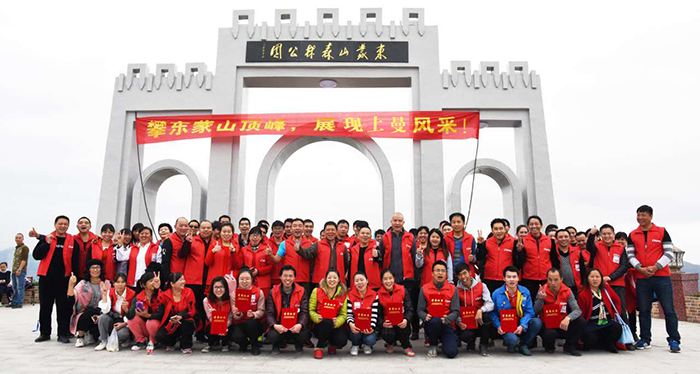As the new year approaches, Shangman Electric organizes its employees to engage in outdoor mountaineering activities. The purpose of this outdoor mountaineering activity is to provide employees with good physical conditions to devote themselves to the work of 2017, face work problems with a positive and optimistic attitude, unite and cooperate, innovate pragmatically, work together for win-win, and create the glory of 2017.
Traveling northwest from the Wuniu Wharf for about 20 minutes, at the foot of the gurgling stream, there is the "Three Heavenly Gates of Dongmeng Mountain", with Dai Wa flying eaves and a simple design. There is a couplet written by Sun Yiyan, a Qing Dynasty official of the Taipu Temple, which reads: "Walking along the mountain, one should step towards the Immortal Mansion; at the door, one should visit the Three Heavenly Feathered Tujia." Climbing up the steep stone steps, the mountains are lush with trees and shrouded in clouds and mist. Passing through the "Earth Rock", looking up, one can see the majestic lion roaring at the Heavenly Peak, with its head held high in the sky, and its majestic presence dominating the mountains. Continuing on, the "Natural Taoist Temple" built along the mountain shines with green trees and bamboo, appearing particularly peaceful and tranquil. There is a couplet at the mountain gate that reads: "Overseas people often shout for dragons to send rain; in the clouds, guests ride on Luan." As they enter the courtyard, there is a huge stone lying on the side of the road, engraved with the three cursive characters "tiger crouching on the rock", written by the official abbot of the Tongbai tree in Tiantai Mountain, Pu Daoren. As the road turns, there is a granite "Dragon Pan Cave" facing you, echoing the "Tiger Crouching Rock" in the distance, full of wit and humor.
Passing through the Longpan Cave is the "Natural View" where the famous Taoist of the Northern Song Dynasty, Lin Lingsu, practiced. There is a huge rock rising from the ground in front of the temple, named "Dantai". It is said that Ge Hong of the Eastern Jin Dynasty once refined pills here. On the cliffs of Danhe, there is an inscription on the journey from the Three Heavenly Gates to the Natural View, which reads "1563 steps up the mountain.". Surrounded by Dantai, there are towering peaks and rugged rocks, towering trees, and lush bamboo cultivation. Nearby, there are also famous scenic spots and historical sites such as Xiaodantai, Qingniuwu, Toutian Cave, Dongzhong Peak, Xiguyan, Baibushui, Shisalichi, and Liyulong.
Looking down from the stage, Qidu Island in the Ou River is like an oval shaped jade inlaid with golden ribbons. Known as the longest highway bridge in China at present - Wenzhou Bridge, it stretches from Wenzhou Longwan in the south to Guantou in Leqing in the north, like a flying rainbow overhead, majestically spanning across Qidu Island. Under the cable-stayed bridge of the Oujiang North Waterway, a flat bottomed giant ship weighing tens of thousands of tons can pass through. When Wenzhou was first established as a county, the estuary of the Ou River was still near the rock peak of Yueqing not far from here. When Xie Lingyun was the Prefect of Yongjia, he once came here to admire the scenery of the sea. He wrote a poem called "Climbing the Panyu Mountain at Haikou in a row of fields": "Who can comfort me with the clouds? Observing the sea by the phoenix in the morning. I cannot distinguish the extreme waves of the flood, but who knows the east of the great valley?... Roaming through the blue sand dunes and the peaks of Yandan Mountain." It seems that when Xie Lingyun climbed the Panyu Mountain, he may take the opportunity to browse the beautiful mountains and rivers along the way, such as Dongmeng Mountain. ". Yu and Shi dialects have similar pronunciations, and Pan Yu is now known as Pan Shi. Although it later lost its magnificent and boundless scenery at the mouth of the Ou River, its important geographical location remained unchanged for thousands of years. The Zhen'ou Battery in Panshi and the Longwan Battery in Wenzhou confronted each other and restrained the Ou River. Throughout history, it has always been a outpost for the people of southern Zhejiang to resist foreign sea invasions.
The natural view is winding and winding, changing step by step. From the stone cave door next to Huju Rock, there is a "Fanxia Ancient Cave" below the Dantai. The mountain breeze inside the cave is gentle, and it is said that the famous Ming Dynasty traveler Xu Xiake also rested here while visiting the mountains and rivers of eastern Zhejiang.
Going down from Dongmeng Mountain, on the Tutan in the west side of Wuniu Wharf, there was a rock that was seven to eight meters long and about five meters high, like a fat water buffalo lying on its back. People called it "Wuniu". The nearby area is named after it. Wuniu Rock appears every day as the tide rises and falls. A folk poet named Wang Shipeng, the top scorer of the Southern Song Dynasty, wrote a poem titled "Ode to the Wuniu": "The strange rocks and peaks call the Wuniu, and the river is independent for thousands of autumn. The spring moss grows on the back like hair, and the summer rain drenches the body like sweat. The green grass is piled up and difficult to enter, and the golden whip cannot turn back. Even if there is a nose and rope that is difficult to enter, the sky and earth are like railings that are not collected at night." Through the vicissitudes of time, this "Wuniu" originally located by the river may have long been like a "mud cow entering the sea". People can only rely on ancient legends to imagine its majestic posture of lying on the waves and treading on the waves.

